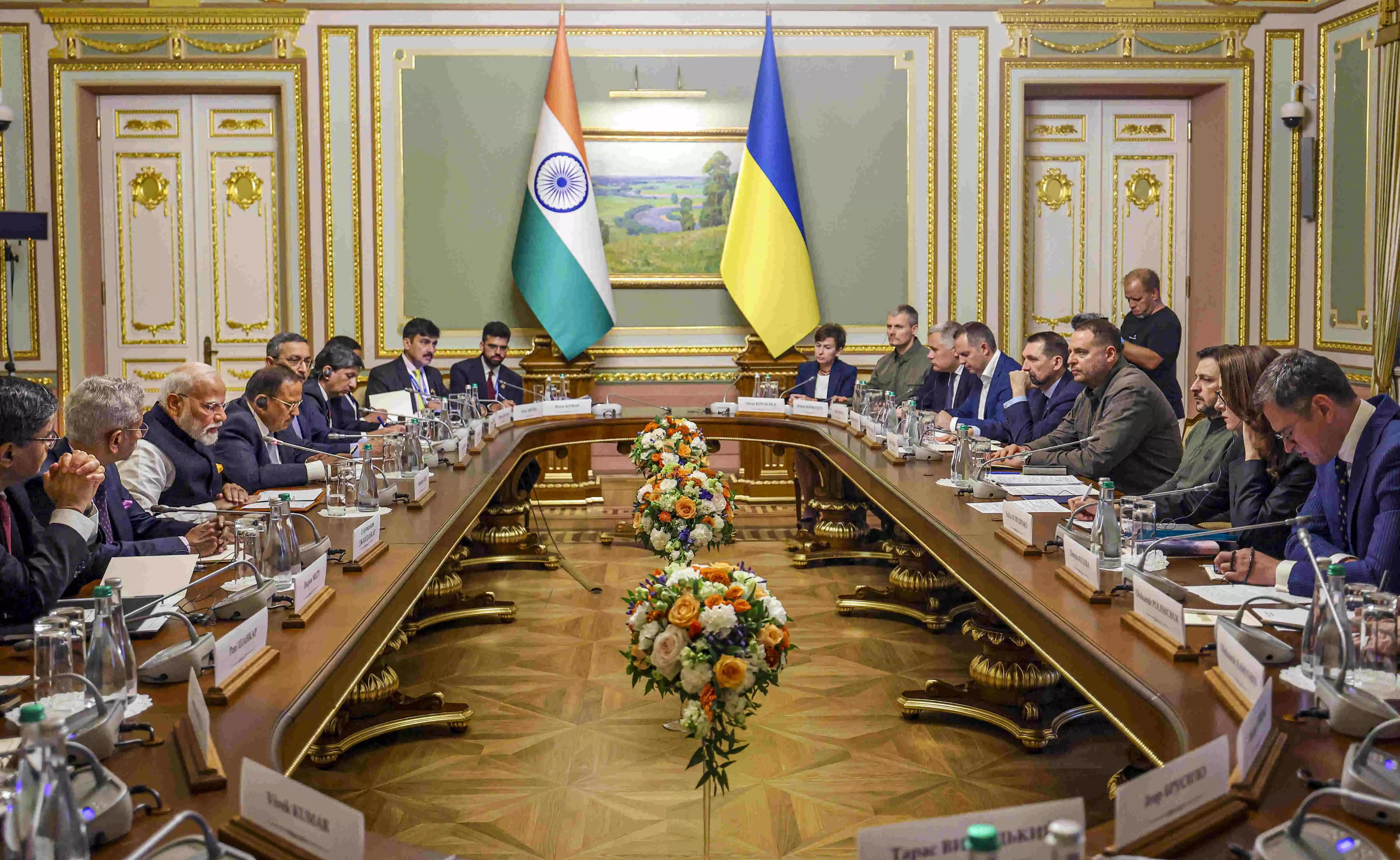A milestone in diplomacy
India’s silent and constructive mediation between Russia and Ukraine is the best bet for the resolution of conflict in the region and also aligns with our independent foreign policy interests

Socrates was the torchbearer of the concept of the dialogue method. Certainly, PM Modi seems to be following in his footsteps. The dialogue method claims that any dispute, disagreement, or difference of opinion can be ironed out through dialogue. Humans are meant to be unidentical by all means. Henceforth, pluralism is the fundamental nature of society. Peace cannot be achieved through war; it can only be attained through understanding.
Recently, we all witnessed a reflection of how the initiative of peace can anytime conquer an ongoing war. Indian Prime Minister Narendra Modi met Ukraine’s President Volodymyr Zelenskyy in Kyiv on August 23. PM Modi proposed that Zelensky should meet Vladimir Putin, the President of Russia, intending to put an end to the war.
The meeting of the two leaders was not at all over the top. PM Modi made sure to keep their meeting purely elementary and constructive. His silent contribution to peace between both countries is a well-known move now. Neither his inputs can be framed as specific peace-making advice to the Ukrainian president, nor does he try to grab the eyeballs by being the heroic peacemaker. Furthermore, his vision and approach towards war in both countries have been the actual game-changers. Following his encounter with Russian President Vladimir Putin, this small gesture towards Ukraine has lifted the fog. Quite soon, PM Modi will be seen attending the BRICS Summit, which will take place in Russia. Furthermore, China will also be in the spotlight at that summit.
Not to forget, every story has an antecedent before an incident. And here is the backstory to the Indo-Ukraine convergence. When the Ukraine-Russia war was at its peak, America and NATO paid their support to Ukraine, whereas Europe broadly backed Russia. China and Russia were on the same axis, followed by both Russia and Ukraine, which were not ready to give up at all. The previous meeting of PM Modi and Ukraine’s President Zelenskyy during the G20 Summit was a run-of-the-mill meeting with a general exchange of thoughts regarding the Ukraine-Russian war. Americans were also interested in establishing a relationship between India and Ukraine. But PM Modi had some other plans for balancing India’s foreign policy. India’s foreign policy still follows the philosophy of non-alignment.
NAM, one of the most important movements during the Cold War, was dissolved, yet the concept of independent foreign policy for India is still in practice. So, India is neither a part of NATO nor wants to be in the future. Besides, Americans are also not concerned about India's intentions towards NATO. In this scenario, despite not being a member of NATO, the equation of India with America is intact. Be it the Republicans or the Democrats, there is a bipolar political issue inside the US, but for India, it's all about the American establishment, which wants to maintain the same. India is all set to nurture its ties with America in business, investment, disinvestment, and whatnot. The Union Minister of Defense, Rajnath Singh, is visiting America for budget and defence procurement.
Meanwhile, India is not ready to delink its diplomatic ties with Russia. It's a long-aged classical relationship that holds several histories together. India has been codependent on Russia for oil imports, arms, and ammunition for several decades. Both countries built and preserved their diplomatic relations before the Nehru and Indira periods. However, their relationship is at stake, as it is not advisable for Indian authorities. Russia is not ready for access, and the nation can be a great neutraliser during the global tension, which is a concern for India. These factors collectively led PM Modi to meet Putin.
The European countries, including the European Union, suggested that India should act as a global negotiator, and PM Modi would be a perfect fit for the role. He has successfully maintained a common relationship with Russia and Ukraine, which is a plus.
PM Modi visited Poland, followed by Ukraine via railway, as it was not preferable based on a security point of view to take a flight. He reached the capital of Ukraine through Rail Force One from Poland after the talk in Warsaw.
Last month, in a talk with Putin, he stated his views regarding how war is only the way towards destruction and not the solution. Furthermore, he expressed the same to Zelensky in Mariinsky Palace: the road to resolution can only be found through dialogue and diplomacy, and we should move in that direction. Both sides should try to seek harmony through mutual conversation to find a way out of this crisis. Modi assured his willingness to contribute in all possible ways to facilitate the return of peace. India is a nation holding a blend of both Buddha and Mahatma Gandhi, which enabled it to lend a shoulder to Ukraine.
HG Wells, a science fiction writer, wrote his famous book, The War of the Worlds, depicting how some living species unrelated to humans came to destroy human habitation and the future after that. But here, reality depicts a completely different story, where we are more indulged in destroying our human race by getting engaged in war.
In the introduction of the book, James Gunn shares a particular tendency for humans to always talk about peace but end up admiring violent stories. The presence of humans and peace has become an oxymoron, so to speak. The idea of war through different transmedia narratives has gained a huge TRP so far. However, nothing can change the fact that war is never a solution to any crisis in civilisation. Rabindranath Tagore stood by his belief that it is a sin to lose faith in humanity. India has decided to apply the same concept in the case of Russia-Ukraine turmoil.
Views expressed are personal



